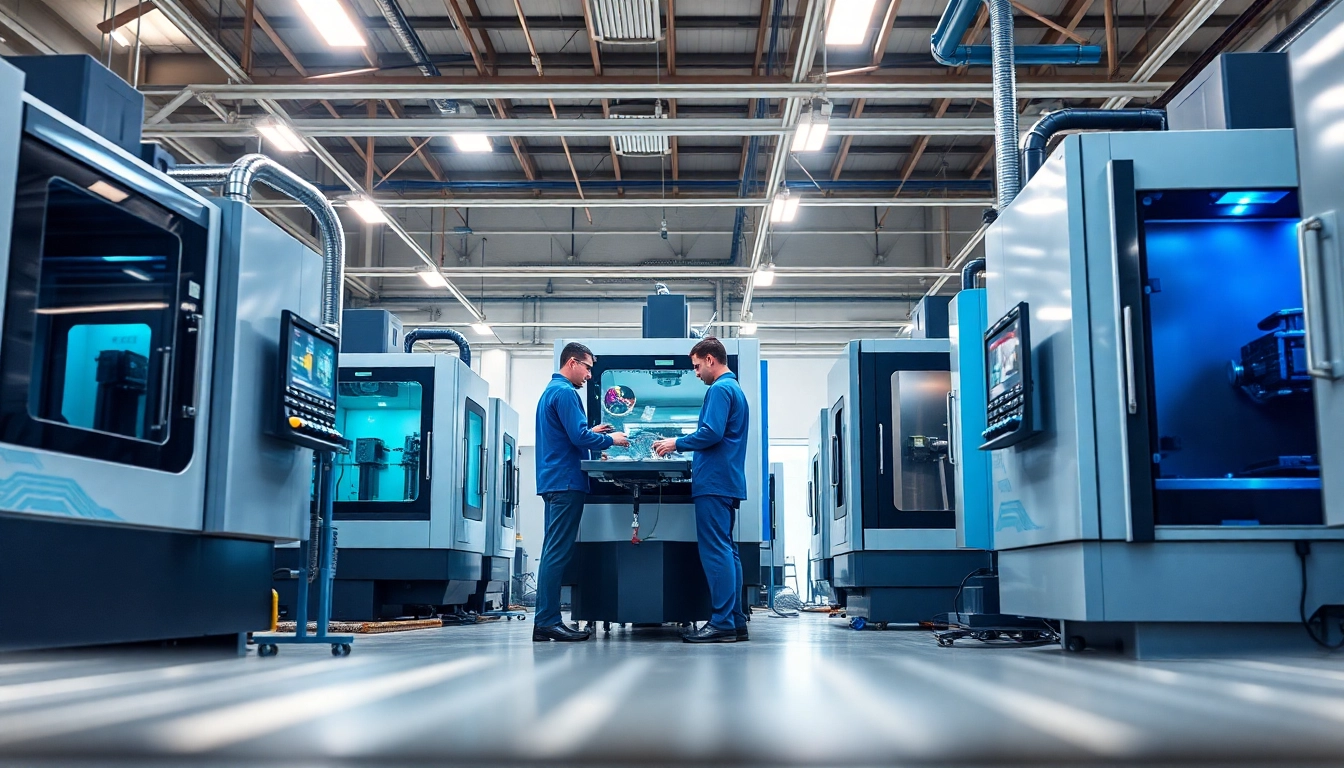Understanding Precision Machining in Malaysia
In the rapidly evolving landscape of manufacturing, precision machining malaysia has emerged as a cornerstone for industries looking to enhance their production capabilities. This highly specialized process involves the use of advanced machinery and cutting-edge techniques to create intricate components with exceptional accuracy. As Malaysia positions itself as a key player in the global manufacturing arena, understanding the nuances of precision machining becomes imperative for businesses aiming to bolster their operational efficiency and product quality.
What is Precision Machining?
Precision machining is a manufacturing process that employs computer numerical control (CNC) technology to produce components with tight tolerances and superior finish quality. This process encompasses a variety of techniques, including milling, turning, drilling, and grinding, which can be used on various materials such as metals, plastics, and composites. The primary goal of precision machining is to create parts that meet exact specifications while minimizing waste and maximizing efficiency.
Importance of Precision Machining in Manufacturing
The significance of precision machining in modern manufacturing cannot be overstated. As industries continue to advance, the demand for high-precision components is increasing across sectors like aerospace, automotive, medical devices, and electronics. Here are a few reasons why precision machining is vital:
- Quality Assurance: Precision machining ensures that every component meets stringent quality standards, reducing the risk of defects and enhancing overall product reliability.
- Cost Efficiency: By optimizing manufacturing processes and reducing waste, precision machining can lead to significant cost savings over time.
- Customization: Precision machining allows for the production of customized parts tailored to specific applications, providing manufacturers with a competitive edge.
- Scalability: Precision machining processes can be easily scaled up or down to meet changing market demands, providing flexibility in production.
Key Technologies Used in Precision Machining
Technological advancements have transformed precision machining, introducing new capabilities that enhance productivity and precision. Some of the key technologies employed include:
- CNC Machining: CNC machines automate the machining process, ensuring high accuracy and repeatability. This technology is widely used for its versatility in producing complex geometries.
- 3D Printing: Additive manufacturing techniques are increasingly integrated with traditional machining processes, enabling rapid prototyping and reduced lead times.
- Laser Cutting: Laser technology offers precision cutting capabilities, allowing for intricate designs without the need for extensive tooling.
- Robotics: Automation through robotics enhances efficiency and reduces labor costs, significantly improving manufacturing output.
Current Landscape of Precision Machining in Malaysia
Malaysia is quickly becoming a hub for precision machining in Southeast Asia. The country has invested heavily in its manufacturing sector, emphasizing the development of high-tech industries that rely on precision engineering. This section explores the current market trends, challenges, and key players in the Malaysian precision machining field.
Market Trends and Growth Projections for 2025
According to recent reports, the Malaysian precision machining market is projected to reach USD 5 billion by 2025, driven by advancements in technology and an increase in demand from various sectors. Factors contributing to this growth include:
- Government Initiatives: The Malaysian government has implemented various policies to promote high-tech manufacturing, providing incentives for companies investing in precision machining.
- Rising Export Demand: As global industries seek reliable suppliers, Malaysian machining companies are positioned to cater to international markets.
- Investment in R&D: Ongoing research and development in manufacturing technologies are enhancing the capabilities and efficiencies of precision machining services.
Challenges Faced by Malaysian Machining Companies
Despite the promising landscape, Malaysian precision machining companies face several challenges that could hinder growth:
- Skill Shortages: There is a notable gap in skilled labor, as advanced machining requires specialized training and expertise.
- Global Competition: Competition from countries with established machining industries, such as China and Japan, poses a significant threat to Malaysian firms.
- Technological Upgrades: Many companies struggle to keep up with rapid technological advancements, which can lead to inefficiencies and quality issues.
Competitor Analysis: Key Players in the Industry
In the competitive landscape of precision machining in Malaysia, several key players have established themselves as leaders. Companies like Setsu Precision and Arex Precision are known for their cutting-edge technology and high-quality products, making significant contributions to the industry. Understanding the strengths and capabilities of these competitors can provide valuable insights for businesses looking to enhance their operational strategies.
Best Practices for Precision Machining
Achieving excellence in precision machining requires adherence to best practices that can multiply efficiency and quality. These practices are essential for businesses seeking to maintain a competitive edge in the market.
Techniques for Achieving High Precision
To produce components that meet the stringent requirements of precision machining, manufacturers should consider adopting the following techniques:
- Tool Selection: Choosing the right tooling material and design is crucial for ensuring long-lasting performance and accuracy.
- Machine Calibration: Regular calibration of CNC machines helps maintain precision and reduces the likelihood of errors in production.
- Process Optimization: Streamlining workflows through advanced planning and automation can increase overall production efficiency without compromising quality.
Quality Control Measures in Machining Processes
Implementing stringent quality control measures is essential for ensuring that every component produced meets required specifications. Effective measures include:
- In-Process Inspection: Regular inspections during the machining process help identify and rectify issues before they escalate.
- Statistical Process Control (SPC): Utilizing SPC techniques can help monitor variations in the manufacturing process, allowing for proactive adjustments.
- Final Product Testing: Comprehensive testing of finished products ensures compliance with industry standards and customer requirements.
Case Studies of Successful Machining Projects
Examining successful case studies can provide invaluable insights into best practices and innovative approaches in precision machining. For instance, a Malaysian aerospace manufacturer successfully integrated advanced CNC technology to reduce production times by 30%, significantly enhancing their service offering to global clients. Such successes highlight the potential for innovation and efficiency in Malaysian machining companies.
Future of Precision Machining: Innovations and Predictions
The future of precision machining in Malaysia looks promising, with a focus on innovation and sustainability driving industry advancements. As the market evolves, certain trends are emerging that will shape the landscape in the coming years.
Emerging Technologies in Precision Machining
As technology continues to advance, several innovations are expected to play a significant role in the future of precision machining:
- Artificial Intelligence (AI): AI is set to revolutionize machining processes by improving decision-making, predictive analytics, and overall efficiency.
- IoT in Manufacturing: The Internet of Things (IoT) will enable real-time monitoring of machines, leading to better maintenance and reduced downtime.
- Advanced Materials: The development of new materials that can withstand extreme conditions will open up new possibilities for precision machining applications.
Sustainability Trends in Manufacturing
As global awareness of environmental issues rises, sustainability is becoming a critical concern in precision machining. Companies are increasingly adopting practices such as:
- Energy Efficiency: Investing in energy-efficient machinery can reduce operational costs and minimize environmental impact.
- Recycling and Waste Reduction: Implementing recycling programs and minimizing waste through efficient production strategies contribute to a more sustainable operation.
- Green Certifications: Pursuing certifications for sustainability can enhance a company’s reputation and appeal to eco-conscious clients.
Skills Needed for Future Machinists
To thrive in an evolving industry, the workforce must be equipped with a diverse skill set. Skills in programming, advanced machining techniques, and knowledge of emerging technologies will be essential for future machinists. Moreover, a commitment to continuous learning and adaptation will be crucial in navigating the challenges and opportunities that lie ahead.
How to Choose the Right Precision Machining Partner
Selecting a precision machining partner is a critical decision that can significantly impact your manufacturing outcomes. The following criteria should guide your selection process:
Criteria for Selecting a Machining Supplier
When evaluating potential machining partners, consider the following factors:
- Experience and Expertise: A supplier with a proven track record and specialized expertise in your industry can provide added value.
- Technology and Equipment: Assess the quality and capabilities of the supplier’s machinery to ensure they can meet your precision requirements.
- Quality Assurance Processes: Understanding a supplier’s quality control measures is essential to ensure consistent product quality.
Evaluating Capabilities and Expertise
To gauge a potential partner’s capabilities, ask for case studies or examples of previous work. Engage in discussions regarding their technological prowess and how they handle complex projects. Furthermore, consider their ability to adapt to changing market demands and customer specifications.
Building Long-Term Partnerships in Precision Machining
Establishing a long-term partnership with a precision machining supplier can lead to enhanced collaboration and mutual growth. Focus on building trust through transparent communication, shared goals, and ongoing feedback, which can lead to improved quality and innovation in your product offerings.



